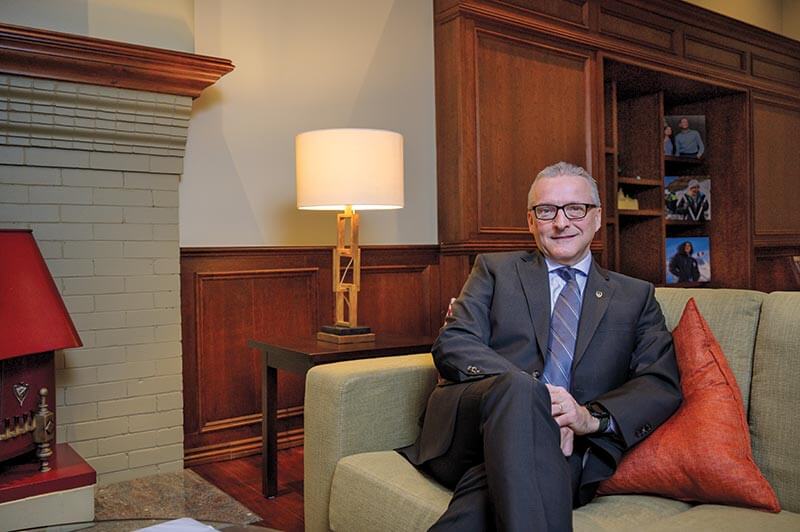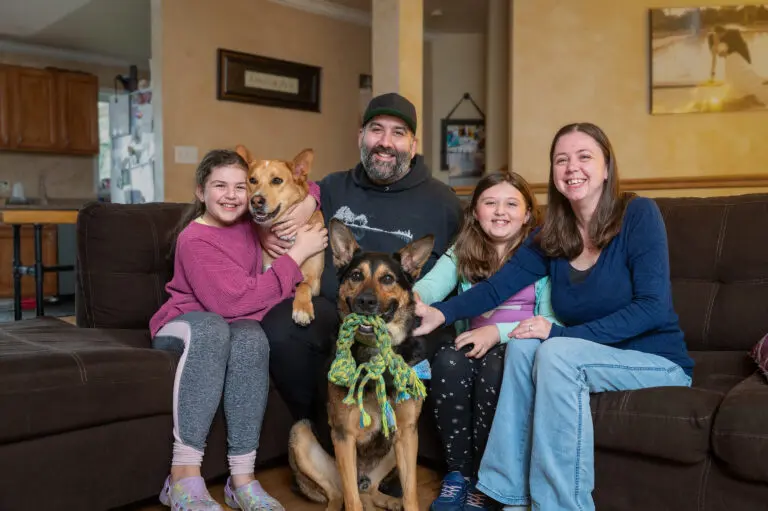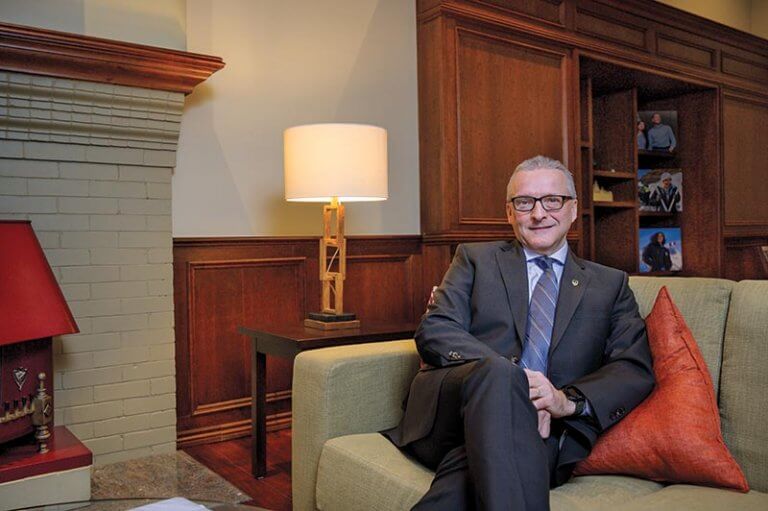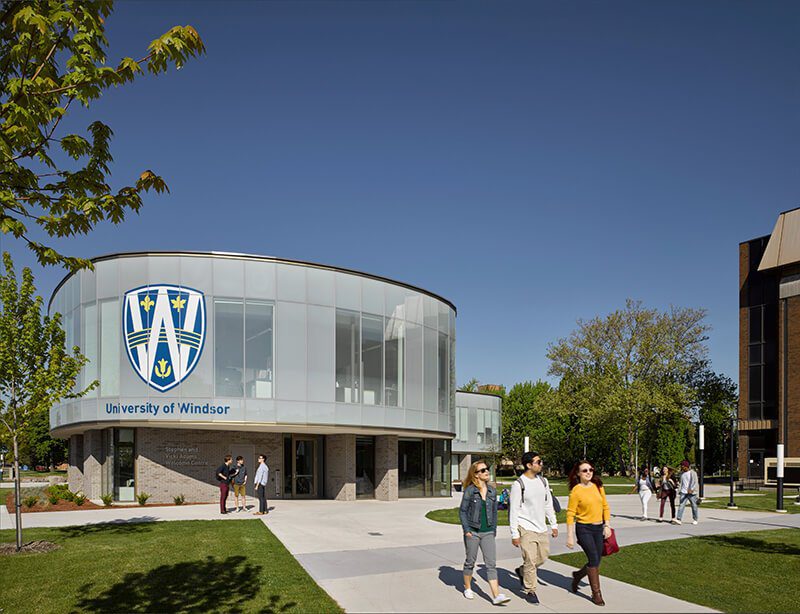
Photo by James Brittain of the Welcome Centre 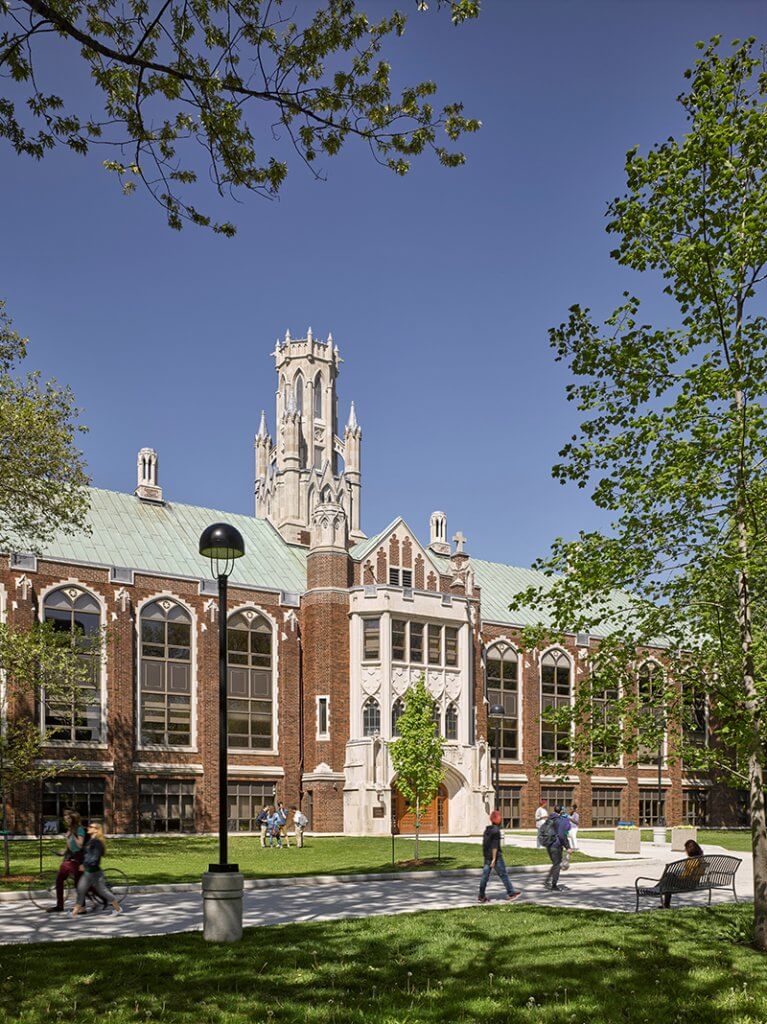
Photo by James Brittain of Dillon Hall
Upheaval is a catalyst for change, and these are trying times. The COVID-19 pandemic has altered the way we think, the way we interact, and the way our society operates. Simple things we took for granted—like handshakes, social gatherings, and sporting events—have all gone by the wayside as we ride the second wave of this pandemic.
Back in February and early March 2020, life was different. Sure, the COVID-19 virus was already spreading elsewhere, but it seemed far away. Many questioned the seriousness of the disease. However, as COVID presented itself in Ontario, and we slowly descended into its midst, our society was turned on its head.
Our educational institutions were not exempt from the changing tides. All local schools were shut down, including the University of Windsor and St. Clair College, and a student’s life soon became a digital world.
“It’s impacted all of us,” states University of Windsor President and Vice-Chancellor Robert Gordon. “I think we did a fantastic job last March in terms of shifting from primarily face-to-face [education] to primarily online in a few days. It was a fantastic effort that continues across the institution. I’m really proud of how our staff and faculty had responded to the shift back in March and certainly how students have responded as well in terms of the new approach to learning.”
Gordon, born in the small midwestern Ontario town of Hanover but raised in Nova Scotia, assumed his role with the university at the beginning of the 2019-2020 school year. He received his bachelor’s and master’s degrees in engineering from McGill University and a doctorate in land resource science from the University of Guelph. He came to the University of Windsor after serving as the provost and vice-president, academic at Wilfrid Laurier University, and dean of the University of Guelph’s Ontario Agricultural College and the Nova Scotia Agriculture College.
“I’ve always seen significant potential for the University of Windsor and this community, how it’s part of the fabric of the region,” explains Gordon. “That really excited me in terms of being a part of that. This is a gorgeous area and, unfortunately, two-thirds of the time I’ve been here we’ve been in a pandemic response. I haven’t had the opportunity to enjoy the region as much as I’d hoped to, but I’m looking forward to that as we move past COVID.”
He says that the Windsor-Essex region is a well-kept secret in Ontario—it is a great place to work, a wonderful community with a lot to do, and provides incredible access to the United States.
Gordon explains that one of the keys to the success of his academic career has been through the building of meaningful and long-lasting partnerships, a philosophy that he applies to his role as university president.
“I think that [partnerships are] essential now that we’re dealing with a pandemic, but also in terms of the opportunities that those partnerships forge to help enhance the student experience, to ensure that we continue to grow better as an institution, focusing on being locally relevant while also globally excellent in what we do,” he states. “Partnerships and building up ways in which we can work with other organizations, both government and non-government, is certainly something I’ve done a lot of in the past and we have the potential to do that even more here in Windsor as we move forward.”
However, the pandemic has caused a fundamental paradigm shift for the University of Windsor. Not just the need, but the necessity of social distancing to lessen COVID-19’s impact on its students and the community as a whole, has caused vast changes in educational services.
“We’ve been paying very close attention over the past 11 months, making sure that the foundation of every decision we make is addressing the health and safety of our community,” states Gordon. “We’ve primarily been focused on our online course delivery, and our intentions were to transition to a little bit more face-to-face in the winter, but given the current health issues and the stay-at-home orders, our decision was to pull back and continue to deliver academic programs, but doing it in a safe way.”
Gordon says that research leadership within the university has done an exemplary job of continuing to operate safely by utilizing social distancing, facility cleaning, PPE, screening tools, and testing protocols.
“There’s a lot of research that’s still taking place on campus, even during the stay-at-home order, but the number of cases [of COVID-19] that we’ve seen from those interactions has been negligible,” he says. “I’m really proud of that. We’ve had a few situations over the past months where there have been a few positive cases on campus, but those were dealt with swiftly, in clear and strongly communicated ways, and our current caseload is zero.”
The future of learning at the university is being steered by the lessons learned on the ground by the school’s administration and faculty. The goal is to take the positive attributes learned through the pandemic and apply them to developing an evolved and more in-tune learning model for future University of Windsor students.
“It’s going to be a different world when we go back to some of the ‘new normal’,” states Gordon. “There are going to be different and heightened expectations of how people interact with one another, but I think it’s going to be appropriate for us to make sure that we’ve learned from this and that we can adopt new approaches to how we support our institution through those lessons learned.”
Something that is likely to come out of the COVID-19 pandemic is the advancement of hybrid learning. As the pandemic took hold in the Windsor-Essex region, the school quickly shifted to online learning for a large portion of its academic programs.
“We’re really excited about people being able to physically come back to our campus and interact with others,” says Gordon. “At the same time, I think there’s going to be a real opportunity for us to look at different approaches to how we deliver programs with maybe a balance of face-to-face and online hybrid delivery for individuals as well too. Thinking about how we best do that is certainly a lot of the conversation that we’re having today, and we’re also making strategic investments into our classroom space at the university to allow more of that hybrid delivery to be able to optimize moving forward.”
The University of Windsor is striving to be a strong community partner during the pandemic and has agreed to a partnership with the Windsor Regional Hospital to provide a vaccination clinic at the downtown campus.
“We want to be seen as an institution that is committed to doing what’s right,” states Gordon. “We’ve been working on a number of issues, institutionally, since the pandemic—equity, diversity, inclusion at the university. We still have a long way to go on some of those important issues, but, for us, we continue to still have a strong commitment to being a post-secondary institution, a university that is committed to global excellence in everything that we do.”
